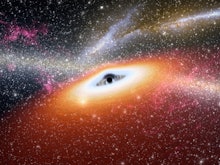Black Holes Might Have Back Doors to the Universe, New Study Suggests

Black holes are tiny points in space so dense that not even light can escape from their powerful gravitational grip.
Or so we thought.
New research suggests that material that gets sucked into a black hole might survive and escape out the other side.
Black holes are one of the biggest mysteries in physics. Scientists can't agree on what happens as matter approaches the edge of a black hole (called the event horizon) and reach its point of infinite density (called a singularity).
Many scientists think there is no way out of a black hole and any matter that goes inside gets shredded to pieces. But there's a growing body of evidence that suggests there might actually be an exit hatch.
The new study
"Black holes are a theoretical laboratory for trying out new ideas about gravity," Gonzalo Olmo, a researcher at the University of Valencia said in a statement.
In this case, Olmo and doctoral student Diego Rubiera tried out one of those new ideas by considering the geometry found in things like graphene and crystals, and applying it to a black hole.
"Just as crystals have imperfections in their microscopic structure, the central region of a black hole can be interpreted as an anomaly in space-time, which requires new geometric elements in order to be able to describe them more precisely," Olmo said. "We explored all possible options, taking inspiration from facts observed in nature."
Their results showed that a black hole's singularity could become a small sphere. That spherical shape can be interpreted as a kind of wormhole or "back door" to the black hole — sort of like the black hole in Interstellar.
The wormhole produced by the research was incredibly tiny. Anyone entering the black hole would have to be stretched and "spaghettified" to fit through a hole smaller than an atom's nucleus. Then, on the other side, they'd get squashed back to their regular size.
The researchers say Matthew McConaughey's character in Interstellar likely would not survive that kind of stretching and squashing. But the results do suggest that matter isn't destroyed in a black hole.
Even Stephen Hawking, black hole expert, has recently said there might be a way out of a black hole, but more research is necessary to know for sure.
Read more: